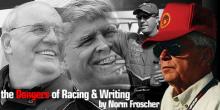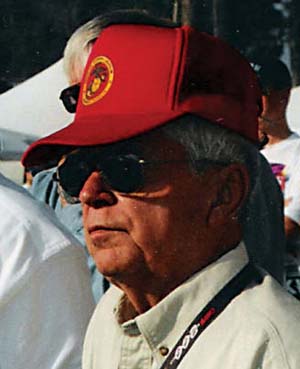NORM FROSCHER - COPING WITH THE LOSS OF RACING FRIENDS
 Perhaps if you're a little squeamish you shouldn't read on.
Perhaps if you're a little squeamish you shouldn't read on.This is about tragedy. Not only on the race tracks, but about everyday life, which claims friends we've made.
It's something racing fans, media and sanctioning bodies have had to cope with from the day the first automobile or motorcycle embarked on a speed test.
It's a fatal accident.
That being said, I have been asked before and probably will be again, but hopefully, not from readers of this space:
"How can you keep covering a sport in which so many people are hurt or lose their lives? Racing is a very dangerous sport?"
They Become Friends Through the Sport
 Perhaps if you're a little squeamish you shouldn't read on.
Perhaps if you're a little squeamish you shouldn't read on.
This is about tragedy. Not only on the race tracks, but about everyday life, which claims friends we've made.
It's something racing fans, media and sanctioning bodies have had to cope with from the day the first automobile or motorcycle embarked on a speed test.
It's a fatal accident.
That being said, I have been asked before and probably will be again, but hopefully, not from readers of this publication:
"How can you keep covering a sport in which so many people are hurt or lose their lives? Racing is a very dangerous sport?"
First, yes, racing is dangerous. But if you want to carry it a bit further, so is football, driving to the grocery store or even crossing the street.
I keep involved and covering racing -- all forms, not just drag racing -- because like those competitors, I love it.
Years ago I had a working newspaperman partner who was covering NASCAR circle track racing and through that became friends with the late Friday Hassler. When an accident at Daytona claimed that driver's life in 1972 my friend said that's it, no more covering racing.
Each person on the media team has a job to do during an incident, to provide correct and timely information to members of the media. You just have to use all your willpower and try and put your emotions on hold and do the job, but it is certainly not an easy task. - Anthony Vestal, NHRA Director of Media Relations
a d v e r t i s e m e n t
Click to visit our sponsor's website
How can you say that, I asked him? It was through racing that you both became friends.
Without racing, you'd never have known him, much less become friends. It was racing that put you together.
No dice. He quit
I'll go into greater detail in a minute, and also get comments from NHRA and NASCAR
media officials, who have little choice in the matter.
But what gives me comfort when I am put in a position we are all in today with racers like
Eric Medlen, Dale Earnhardt, Davey Allison, Darrell Russell and way back to Glenn "Fireball" Roberts.
Without racing, we would never have become friends. And you know, the same goes for others.
Without racing, we might have passed on the sidewalk without a word, instead of becoming friends.
And shoot, it's not just racing. but other sports and I as said earlier, other activities.
* The founder of FastNews Network, late friend Eddie Dykes, loved this sport, but ironically, he was claimed in an airplane crash.
* As was boxer and friend Rocky Marciano. Not too long after he and I became friends and I spent some time with him in Ocala, where he was a frequent visitor.
The message here, in keeping with that first question, is should we not make friends with anyone who flies, because it's dangerous?
Football. Yeah, I've covered my share of college and pro games. In fact, that was how I first met and became friends with Bear Bryant, Joe Gibbs, Darrell Royal, Bill Peterson, Charley Pride and others.
* Without football, I never would have known them except through newspaper accounts. The same goes for Red Dawson, an assistant coach at Marshall, who was NOT on that tragic plane crash because of a recruiting assignment.
So it is with racing.
And most recently, the late Eric Medlen. Without racing, I would never had met him, dined with him, interviewed him, wrote about him and became friends.
Everyday life claimed others, friends I met through racing.
Benny Parsons and Bobby Hamilton, for instance.
They were claimed not by racing accidents, but by that disease we all hope to whip, cancer. But it was through racing I got to know them as friends and like others, the fact they were lost in that manner doesn't lessen the mourning.
We mentioned Rob Morosso.
*Yeah, on the highway.
* The same with friend John Myers.
Does that mean we won't become friends with anyone who travels on roads in automobiles and on motorcycles, or even flies.
If I haven't made my case by now, I apologize.
I tried.
a d v e r t i s e m e n t
Click to visit our sponsor's website
I promised a couple of comments from media officials in NHRA and NASCAR on the subject. You know, the shock and how they cope.
So here goes, first Anthony Vestal, media relations director of NHRA:
"As you can imagine, anytime a driver is lost during a race weekend it is an extremely difficult situation. In most instances, the driver may have been someone you just talked with in the pits, or he or she could have just visited the media center. When a crisis hits, it can be very difficult to put on your game face and do the job, especially if you have a close personal relationship with that driver.
"In this business we work very closely with all drivers, so it is highly probable that will be the case.
"Each person on the media team has a job to do during an incident, to provide correct and timely information to members of the media. You just have to use all your willpower and try and put your emotions on hold and do the job, but it is certainly not an easy task."
And here is Jim Hunter, vice president for corporate media relations for NASCAR. Both Vestal and Hunter are former print journalists, so they know whereof I write.
"Safety has always been NASCAR's primary concern. Big Bill France, Bill France, Jr. And now Brian France have been committed to making race cars as safe as humanly possible," Hunter says. "The addition of the Research and Development Center in Concord, N. C., has been instrumental in helping NASCAR and its teams improve the structural safety of the cars in recent years.
"We will continue to seek improvements, things like Safer Barriers, the Hans device, additional crush panels on the cars to better absorb high speed impact and any other improvements our engineers can recommend.
"Stock car drivers realize there is inherent danger in the sport, just like football players or any other athletes engaged in contact sports.
"You have to move on and that's hard to do..... very hard to do."
Hard indeed, but those rememberances came through racing.
| {loadposition feedback} |




